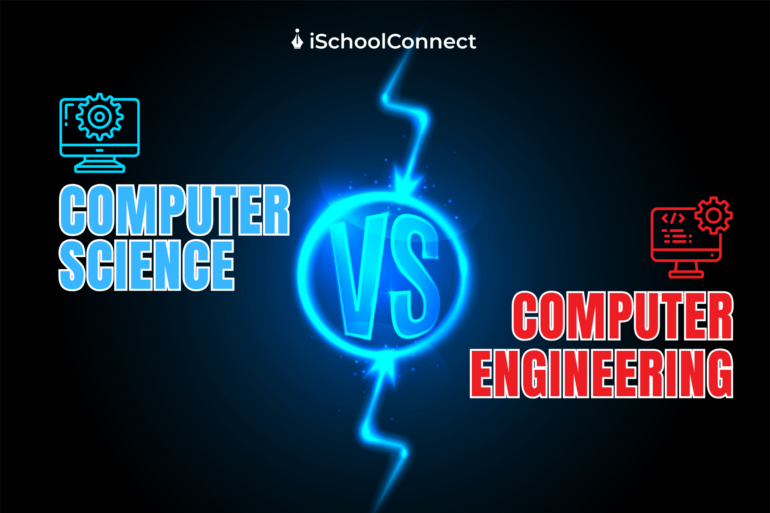Table of Contents
- Decoding the differences between Computer Science and Computer Engineering
- Hardware vs. software
- Scope and focus
- Core curriculum
- Programming emphasis
- Career trajectories
- Problem-solving approach
- Mathematical foundation
- Electronics and circuits
- The choice between Computer Science and Computer Engineering
- Key takeaways
- FAQs
Decoding the differences between Computer Science and Computer Engineering
Choosing a major is a crucial choice that affects both your academic and professional paths. Two degrees that frequently pique curiosity in the world of technology are Computer Science (CS) and Engineering (CE). Although these areas have many things in common, they also differ greatly, meeting different skill levels and professional goals. In this blog, we will examine the key distinctions of Computer Science vs. Computer Engineering to help students decide which field best suits their objectives.
Hardware vs. software
A fundamental distinction lies in the primary focus of each major. Computer Science gravitates toward software development, encompassing areas such as software engineering, artificial intelligence, and database management. Computer Engineering, on the other hand, leans towards hardware, involving the design and optimization of computer systems, microprocessors, and integrated circuits.
Scope and focus
Computer Science primarily deals with the theoretical aspects of computing. It encompasses the study of programming languages, data structures, algorithms, and the fundamental principles that underlie software development. On the other hand, Computer Engineers focus on the hardware aspects of computing systems, including the design and development of computer components such as processors, memory systems, and communication interfaces.
Core curriculum

The curriculum for Computer Science majors typically includes courses in programming, software development, algorithms, data structures, computer architecture, and theory of computation. Computer Engineering majors, on the contrary, delve into a combination of Computer Science courses and hardware-oriented subjects, such as digital logic design, embedded systems, and computer organization.
Programming emphasis
While both majors involve programming, the emphasis differs. Majors in Computer Science involve the study of algorithmic problem-solving, software development processes, and programming languages in great detail. In contrast, Computer Engineering majors use programming as a tool for hardware design and may focus on languages suitable for tasks such as embedded systems programming or digital design.
Career trajectories
The career paths diverge significantly between Computer Science vs Computer Engineering. Computer Science graduates often pursue roles as software developers, programmers, data scientists, or system analysts. On the other hand, Computer Engineering graduates are well-equipped for positions involving hardware design, embedded systems development, and working with computer architecture.
Problem-solving approach
Computer Science majors develop strong problem-solving skills, often tackling abstract and algorithmic challenges. They analyze complex problems, design efficient solutions, and implement them through programming. Computer Engineering majors, meanwhile, approach problem-solving with a focus on optimizing hardware performance, integrating various components, and ensuring the efficient functioning of computer systems.
Mathematical foundation
Both majors require a solid foundation in mathematics, but the emphasis varies. Computer Science majors typically delve into discrete mathematics, algorithm analysis, and mathematical logic. Computer Engineering majors often engage with more applied mathematics, including differential equations, calculus, and linear algebra, especially in the context of hardware design and signal processing.
Electronics and circuits
Computer Engineering involves a deeper exploration of electronics and circuits. Understanding how hardware components function at the electrical level is crucial for Computer Engineering majors. Designing and optimizing the architecture of computer systems involves applying this knowledge. While Computer Science majors may have a basic understanding of hardware, they focus more on the software layer.
The choice between Computer Science and Computer Engineering
Making the crucial selection between both the fields depends on your personal preferences, professional goals, and the fields of technology that interest you. After understanding the distinctions between these two fields, it is clear that Computer Science is more interested in the complex world of software development and algorithmic problem-solving. In contrast, Computer Engineering is more interested in hardware, including computer system design and optimization. Both options provide different career paths. Careers in hardware design, embedded systems development, and computer architecture are all made possible by a degree in Computer Engineering. Meanwhile, Computer Science influences jobs in data science, artificial intelligence, and software development.
The decision should align with your passion and professional goals. Whether you’re drawn to coding, algorithmic puzzles, and software innovation, or you find excitement in understanding the physical components that power computers, both fields lead to rewarding careers. You can make an informed choice by carefully considering the scope, curriculum, programming emphasis, hardware vs. software focus, career trajectories, problem-solving approaches, and so on. The key is to embrace the path that resonates with your aspirations, ensuring that your academic and professional pursuits align with your passion for innovation and problem-solving.
Key takeaways
- The choice between both fields is highly individual, depending on personal interests, career goals, and preferred areas of specialization.
- Computer Science majors deal with programming, algorithms, and software development, while Computer Engineering majors combine Computer Science courses with hardware-oriented subjects such as digital logic design and embedded systems.
- Deciding between Computer Science vs Computer Engineering requires careful consideration of several factors that align with personal passion and professional goals.
Share your thoughts and questions about this blog in the comments below! For more information on international courses, click here to reach out to us. We’re here to assist you.
Liked this blog? Read next: Top 10 hospitality management courses worldwide
FAQs
Q1. Are there opportunities for crossover or dual expertise in both Computer Science and Computer Engineering?
Ans- Interdisciplinary courses related to computer studies allow students to gain knowledge in both Computer Science and Computer Engineering, providing a broader skill set and flexibility in career choices.
Q2. Are there specific industries or sectors where Computer Science graduates are more in demand than Computer Engineering graduates, and vice versa?
Ans- Computer Science graduates are often sought after in industries such as Software development, artificial intelligence, and data analytics. Computer Engineering graduates have a high value in hardware design, embedded systems, and computer architecture sectors.
Q3. Can you provide specific programming languages that Computer Science majors typically focus on and those relevant to Computer Engineering majors?
Ans- Computer Science majors may focus on languages such as Python, Java, and C++. In contrast, Computer Engineering majors might use languages suitable for hardware design, such as Verilog or VHDL, and languages for embedded systems, such as C and Assembly.






